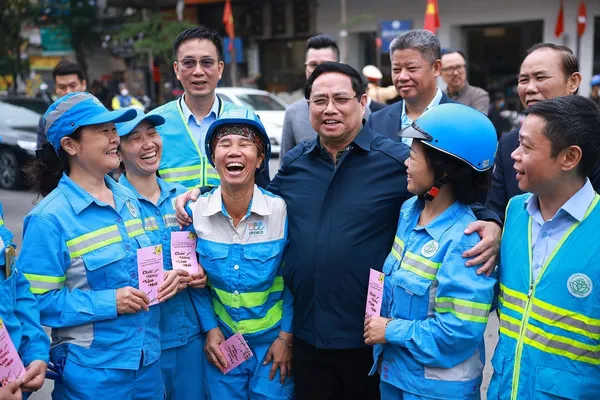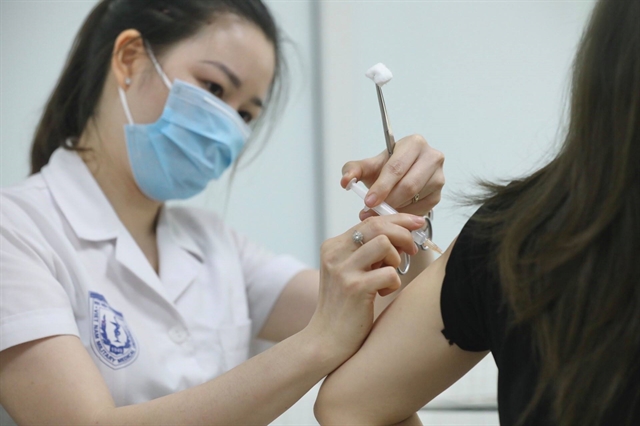 Society
Society


|
| Health staff give Nano Covax COVID-19 vaccine shot to a volunteer in the third phase of human trials of the vaccine on June 11. — VNA/VNS Photo Minh Quyết |
HÀ NỘI — The licensing of a COVID-19 vaccine, even for emergency use, must be based on sufficient scientific data, a Ministry of Health official has said.
Deputy Director of the Department of Science, Technology and Training Nguyễn Ngô Quang was speaking in response to reports that Nanogen Pharmaceutical Biotechnology Joint Stock Company had called for an approval for emergency use for its COVID-19 vaccine Nano Covax, the most promising Vietnamese-made vaccine to date which has entered phase 3 human trials, amidst the severe fourth wave of infections in the country.
Quang said before a vaccine can be widely administered to the people, the Ministry of Health needs data on safety, immunogenicity and protective efficacy.
In the case of the Nanocovax vaccine, only 1,000 people have been administered the experimental shot in the phase 3 which started on June 11, still a small number, Quang said.
The four vaccines that are granted conditional approval in Việt Nam - AstraZeneca, Sputnik V, Sinopharm's Vero Cell, and Pfizer - have passed phase 3 which involves 30,000-50,000 subjects.
"In case Việt Nam does not have access to imported COVID-19 vaccine sources until August-September 2021, and if the pandemic situation in the country is still complicated, we will make [decisions] on the data proving the safety, immunogenicity and protective effect on the first 1,000 cases of injection and consider authorisation for emergency use."
However, Quang also noted that "this is an option only to be considered in case of an emergency". Given that Việt Nam already has access to imported COVID-19 vaccines with clear research results such as Pfizer, Moderna, Sputnik V or other vaccines approved by the WHO, priority will be given to those imported sources instead of vaccines without enough data.
“The view of the Ministry of Health as a whole and the view of myself as an individual is that we are fully supportive of the research and development of locally made vaccines to ensure supply of vaccines in Việt Nam. This is a very appropriate directive of the Government,” Quang said.
"But we will bear the responsibility to explain to the people about whether this vaccine is effective or not, on what basis to say it is effective and why do we agree to license it? The goal of the health sector is to protect the health of the community, thus benefits and risks should be carefully weighed.”
“This is us being extra cautious, not making it difficult for the enterprise,” Quang said.
The current data shows the COVID-19 vaccine Nano Covax is safe and has immunogenic properties, but facts about its effectiveness have to wait for more research and further testing.
To have enough scientific basis to evaluate a vaccine, it is necessary to follow up 36, 45 and 56 days after the first injection. Only on that basis, it is enough to meet the criteria to evaluate the immunogenicity and protective effect. So we can only evaluate a vaccine at least after two months from its first jab,", Quang said.
First 1,000 jabs in third-phase trials of Nano Covax
The administration of the first 1,000 shots in the third-phase trials of Nano Covax were given to about 880 volunteers in the northern region under the Hà Nội-based Việt Nam Military Medical University’s coordination and more than 120 others in the south under the co-ordination of the Pasteur Institute in HCM City.
The shots were administered on a 6:1 ratio, which meant six people got the vaccine and one received a placebo, according to Lt. Col. Chu Văn Mến, director of the university’s Centre for Clinical Trials and Bioequivalence.
The volunteers will have blood samples taken to test the generation of immunity by July 30, and data about the vaccine safety and immunity generation is set to be available by mid-September.
After the first 1,000 volunteers, the trials of Nano Covax will continue on another 12,000 people on a 2:1 ratio, with two getting the vaccine and one the placebo. The third-phase trials, using only the 25mcg doses, will cover 13,000 volunteers aged between 18 and 75 nationwide.
Results of the first two stages show good immunity generation in all volunteers, Mến noted.
Nano Covax has been developed by the Nanogen Pharmaceutical Biotechnology JSC since May 2020. The first-phase trials began on December 18, 2020, while the second phase started on February 26 this year, and the third on June 11. Việt Nam also has several other vaccine candidates under development. — VNS




